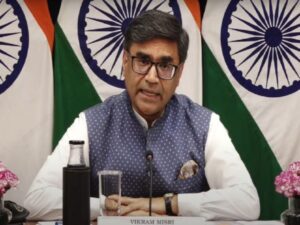Brain drain in Middle East countries entails an ignorance cost amounting to trillions of dollars
Nicosia [Cyprus], January 16 (ANI): It is no secret that over the years almost all Middle East countries have been facing a huge brain drain, as a big proportion of their best and brightest students and scientists decide to leave their country forever and continue their career abroad.
This means that Middle East countries lose thousands of talented people who could have played a big role in developing the economy and the fortunes of their homeland. “Over the years, there has been a brain drain in the Arab world, with talent moving to the West. Tens of thousands of our youths emigrate looking for better opportunities — ignorance cost a loss of more than US$2 trillion to the Arab world,” Mohammed Al Gergawi, UAE Minister of Cabinet Affairs pointed out.
According to several studies carried out by UNESCO, the Arab League and the World Bank, the Middle East and the Arab World are responsible for about one-third of the brain drain from developing countries. The countries where Arab scientists and other highly skilled professionals migrate are mainly European Union member states, Australia and Canada. About half of these highly qualified and talented people who leave their country or remain abroad are doctors, 23 per cent engineers, and the rest professionals in other specialties.
Another worrying fact that emerged from these reports was that 54 per cent of the Arab students studying abroad do not return to their country, some of them because they cannot find work due to the non-existence of relevant scientific research fields in their homeland. Arab students alone constitute 34 per cent of the student population in Britain. About 100,000 scientists, engineers, and doctors each year come from Egypt, Jordan, Iraq, Tunisia, Morocco, and Algeria.
Egyptian MP Hazem El-Gendy, in a speech last June before the Egyptian Parliament, said that Egypt has witnessed an unprecedented migration wave of medical personnel. He cited statistics showing that about 110,000 doctors have left the country in the past three years – half of Egypt’s estimated 215,000 doctors. “The reason for the emigration of doctors is the low wages, as well as the low medical capacity and insufficient medical supplies in public hospitals,” he said.
But what makes the brightest and best-educated people in the Middle East leave their countries and seek employment in foreign lands? Obviously, war, violence and ethnic cleansing are pressing reasons not only for highly educated people but also for anybody to leave a war-torn country or a place where people are subjected to physical violence or religious or ethnic discrimination.
Academics in many countries of the world – and the Middle East is no exception – are subjected to harassment, detention, torture and systematic persecution because of their work, which is not in line with the wishes of their government. Sometimes they pay with their lives for their dedication to their academic work and freedom of thought. Often, they are also harassed by militias or paramilitary groups.
Therefore, those who can, flee from their country of origin and seek employment in universities and schools of the West, causing a brain drain in their homeland.
Henry Jarecki, of the Scholar Rescue Fund of the Institute of International Education, says that Middle Eastern scholars endure gender discrimination, instability in such countries as Iraq, repressive regimes, particularly in Iran, as well as often falling foul of strict religious codes and anti-blasphemy laws.
High unemployment, corruption, nepotism and cronyism, are prevalent in some countries, forcing qualified people to seek a better life elsewhere where they can work in their chosen field or exercise their profession, without state interference, and where they have equal opportunities to compete for jobs.
As some Middle East countries, like Lebanon and Turkey, are facing a serious economic crisis, with rampant inflation that makes it extremely difficult to buy bread, milk or meat, professionals and academics try desperately to find employment in foreign countries.
A few days ago, Turkish President Recep Tayyip Erdogan said that his goal is to turn Turkey into a magnet for Turkish scientists all over the world and added: “We are strengthening the academic environment in Turkey and reversing the direction of the brain drain.”
Zvi Bar’ el, Haaretz newspaper foreign affairs expert, points out: “Turkish President Recep Tayyip Erdogan wants to prevent a brain drain, but the threat to academic freedom and personal liberty in Turkey is driving academics to emigrate. According to surveys in the past two years, the economic crisis is a crucial factor – the sharp decline in the buying power of the Turkish lira has pushed young academics to seek their future in Europe and the United States. But that isn’t the only reason.” And he continues:
“The feeling of oppression and persecution of academics and researchers in the universities due to government paranoia, which began with the attempted coup in July 2016, threatens academic freedom and the personal liberty of many people. Senior lecturers and researchers have lost their jobs, many researchers lost their budgets, and certain subjects of study were banned due to their political sensitivity.”
Several Middle East leaders pay lip service to need to stop the emigration of professionals and scientists but in practice, they do nothing to remove the underlying reasons for the brain drain.
To stop the escalating ignorance cost, Middle East Governments must increase funding for research and professional and scientific services. What is more important is that they must allow qualified professionals, academics and scientists to work without government interference and coercion.
A good example in this respect was given last year by the “Great Arab Minds” initiative of the United Arab Emirates.
Last year, the UAE the Ruler of Dubai Mohammed bin Rashid Al Maktoum established the “Great Arab Minds” project, a USD 27.m fund, the purpose of which is to identify Arab researchers, intellectuals and professionals in the fields of physics, mathematics, data science, economics and higher education and give them funding to support their work.






